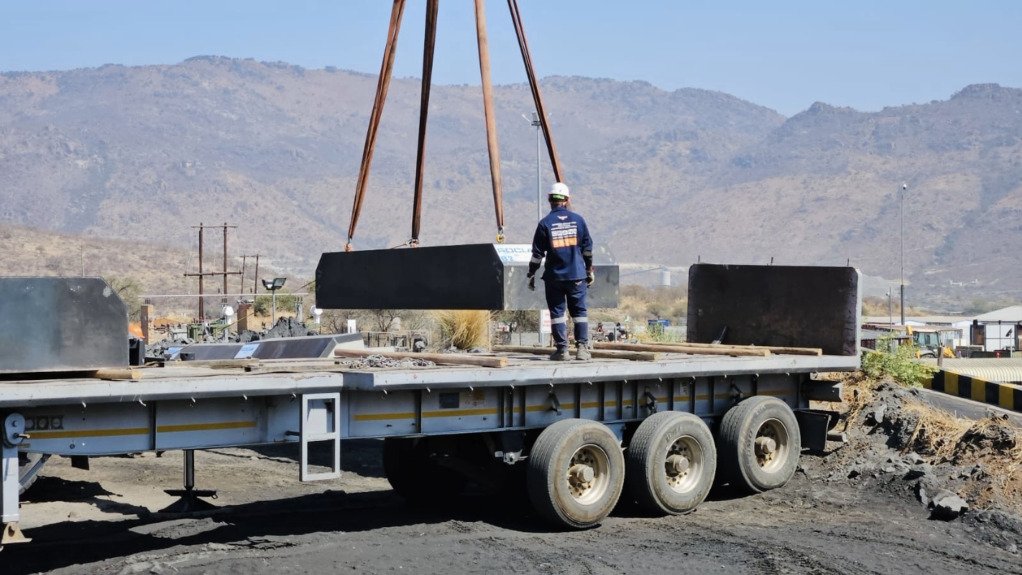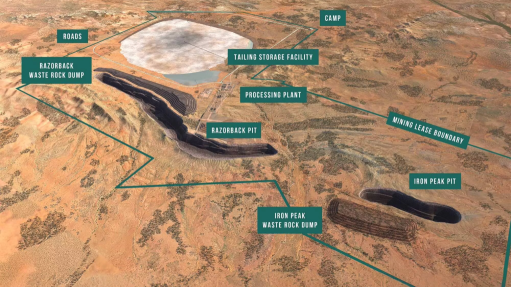Precast solutions reduce downtime


REDUCED DAMAGE The cladding in the precast slab ensures that the structure is not damaged from the day-to-day hammering of heavy machinery and vehicles operating in the stockpile area
Photo by Rocla
A Limpopo-based mine contracted concrete product supplier Rocla Polokwane to manufacture a precast solution for its surface stockpile tunnel, which had become structurally unstable barring the use of temporary additional supports.
The mine approached Rocla following the loss of full operational functionality of its stockpile, which impacted on its daily operations.
Rocla technical executive Muhammad Bodhania explains that the surface stockpile area continuously faced downtime owing to the tunnel being damaged by machinery and vehicles.
“The tunnel structure supports the stockpile and hoppers feeding a conveyor in the tunnel that supplied the metallurgical beneficiation plant on the mine. The client required the structural integrity of the tunnel to be restored to allow full operational functionality of the stockpile and conveyor.”
He adds that “the process of shuttering, fixing casting and curing – even if rapid strengthening concrete were specified – would have exceeded the timeframe to carry out the required rehabilitation works”.
Consequently, the preferred solution entailed the use of segmented steel-clad precast concrete sections assembled on site to ensure that Rocla would not exceed the short time period stipulated by the client.
This entailed the manufacturing of foundation blocks placed on either side of the existing tunnel supporting a 4.6-m slab spanning over the existing tunnel with a 100 mm clearance over the existing tunnel. This approach ensured that no load would be transferred to the existing, structurally unsound tunnel.
The 7-m-high stockpile, which had a bulk density of 30 kN/m3, necessitated that the slab be designed to support a 210 kPa load. The cladding ensured that the structure was not damaged from the day-to-day hammering of heavy machinery and vehicles operating in the stockpile area.
This solution required detailed planning and coordination of the various parties to ensure successful project execution.
In total, 45 products, or sections, were manufactured, with some having a mass of 15 t. Moreover, given the shape of the products, they were cast upside down and had to be rotated prior to delivery.
Rocla, in partnership with its handling equipment supplier, ensured that these rotations were carried out safely.
“Rotating 15 t comes with a lot of challenges and risks that have to be addressed to ensure a safe operation,” states Bodhania.
Prior to the placement of the sections, ground preparations were completed, and the stockpile was cleared.
After the necessary compaction, self-levelling, quick drying screed was used to create a level surface for the foundation sections. The process was verified by the survey team to ensure that the levels were accurate prior to the placement of the precast tunnel.
Over 750 t of precast concrete segments were assembled safely one week ahead of schedule, creating a tunnel more than 40 m long, ensuring that the stockpile area operations returned to functionality at maximum capacity.
“This project has showcased the team’s ability to meet all challenges through innovative design, expertise and capability while keeping to a tight schedule. This is a reflection of our commitment to our customers’ requirements,” Bodhania comments.
Meanwhile, in September, Rocla reported the completion of an order to supply and deliver 496 heavy-duty, 3-m Alfablocs. This order amounted to 1 400 t of concrete and 500 truckloads, including all the anchorage components, which included 1 984 resin capsules, threaded rod studs, washers and nuts.
This followed a product request by a mining client to create 3-m-high storage bins for material with a bulk density of 2 700 kg/m3.
“This material would also be required to be stored at a 25° angle of repose, above the bin wall height, extending up to almost 6.2 m above floor level in the centre of the bins. Accordingly, each three-sided bin would need to store about 525 m3 and 1 400 t of product. In total, 14 bins, with a total capacity of about 7350 m3 and 19 600 t would be required. Rocla suggested its ALFABLOC walling system,” notes Rocla sales engineer Justin Kretzmar.
At the time, Rocla’s ALFABLOC range included 1.2-m-, 2.4-m- and 3-m-high blocks but the standard 3-m-high blocks had a maximum rated bulk density for stored material of 1 600 kg/m3 in free-standing orientation with 25° repose loading, “so a solution had to be found to increase this by almost 70%”.
This would prove to be challenging, but not insurmountable.
“Our engineering team determined that anchoring the blocks with chemical anchors to an engineered surface-bed and redesigning and increasing the steel reinforcement in the blocks, thereby creating a heavy-duty range of ALFABLOCS, [would] achieve the required loading,” Kretzmar comments.
Another challenge was the lead time requirements. Rocla’s existing production capacity was more suited to projects requiring less than 100 blocks, unlike this project which required close to 500 new heavy-duty units, including many 90° corner blocks. This meant that Rocla’s in-house engineering and fabrication teams had to build new moulds to speed up stripping, preparation and production by cycling the moulds on a daily basis.
Kretzmar concludes that all Rocla concrete used in ALFABLOCS has a guaranteed 28-day strength of 35 MPa which, coupled with steel mesh, provides a solid barrier against intrusion. Further, the steep slope and smooth off-shutter finish provide protection against climbing.
Article Enquiry
Email Article
Save Article
Feedback
To advertise email advertising@creamermedia.co.za or click here
Press Office
Announcements
What's On
Subscribe to improve your user experience...
Option 1 (equivalent of R125 a month):
Receive a weekly copy of Creamer Media's Engineering News & Mining Weekly magazine
(print copy for those in South Africa and e-magazine for those outside of South Africa)
Receive daily email newsletters
Access to full search results
Access archive of magazine back copies
Access to Projects in Progress
Access to ONE Research Report of your choice in PDF format
Option 2 (equivalent of R375 a month):
All benefits from Option 1
PLUS
Access to Creamer Media's Research Channel Africa for ALL Research Reports, in PDF format, on various industrial and mining sectors
including Electricity; Water; Energy Transition; Hydrogen; Roads, Rail and Ports; Coal; Gold; Platinum; Battery Metals; etc.
Already a subscriber?
Forgotten your password?
Receive weekly copy of Creamer Media's Engineering News & Mining Weekly magazine (print copy for those in South Africa and e-magazine for those outside of South Africa)
➕
Recieve daily email newsletters
➕
Access to full search results
➕
Access archive of magazine back copies
➕
Access to Projects in Progress
➕
Access to ONE Research Report of your choice in PDF format
RESEARCH CHANNEL AFRICA
R4500 (equivalent of R375 a month)
SUBSCRIBEAll benefits from Option 1
➕
Access to Creamer Media's Research Channel Africa for ALL Research Reports on various industrial and mining sectors, in PDF format, including on:
Electricity
➕
Water
➕
Energy Transition
➕
Hydrogen
➕
Roads, Rail and Ports
➕
Coal
➕
Gold
➕
Platinum
➕
Battery Metals
➕
etc.
Receive all benefits from Option 1 or Option 2 delivered to numerous people at your company
➕
Multiple User names and Passwords for simultaneous log-ins
➕
Intranet integration access to all in your organisation


















